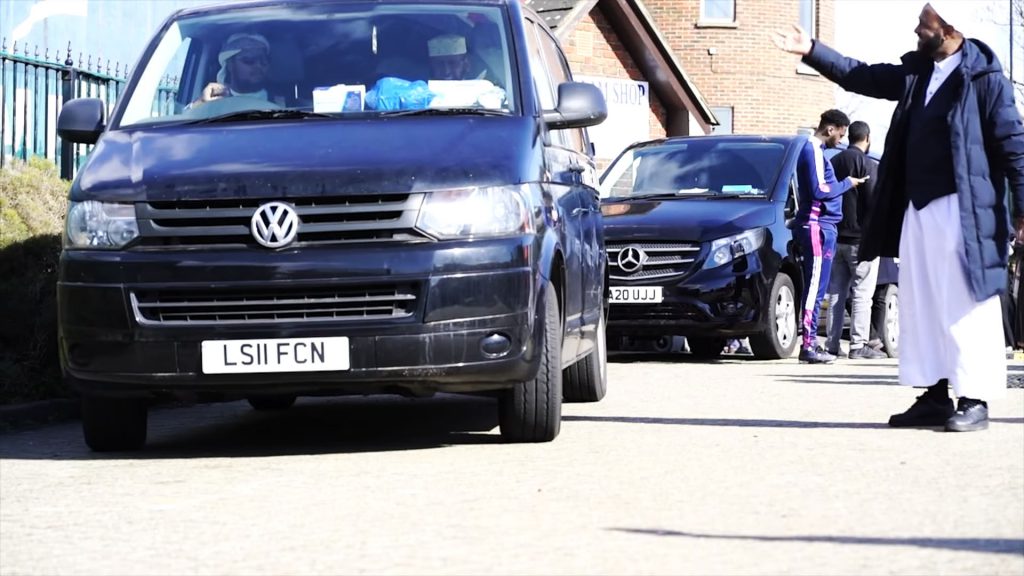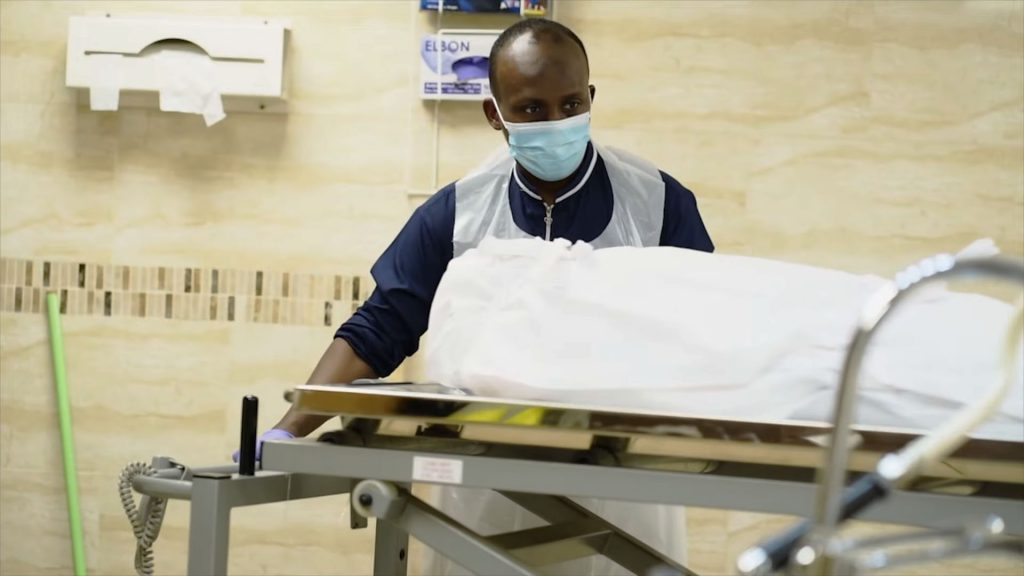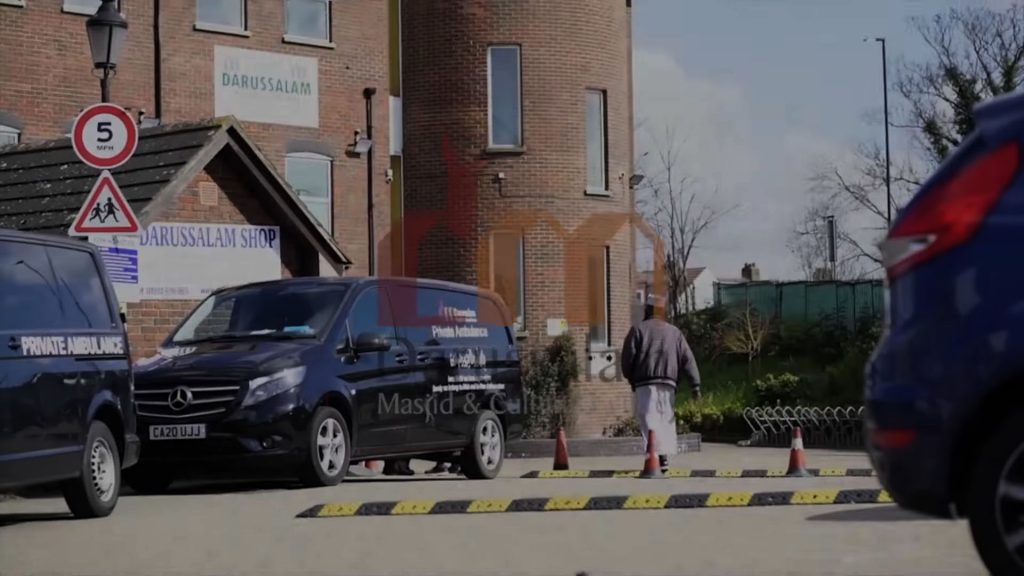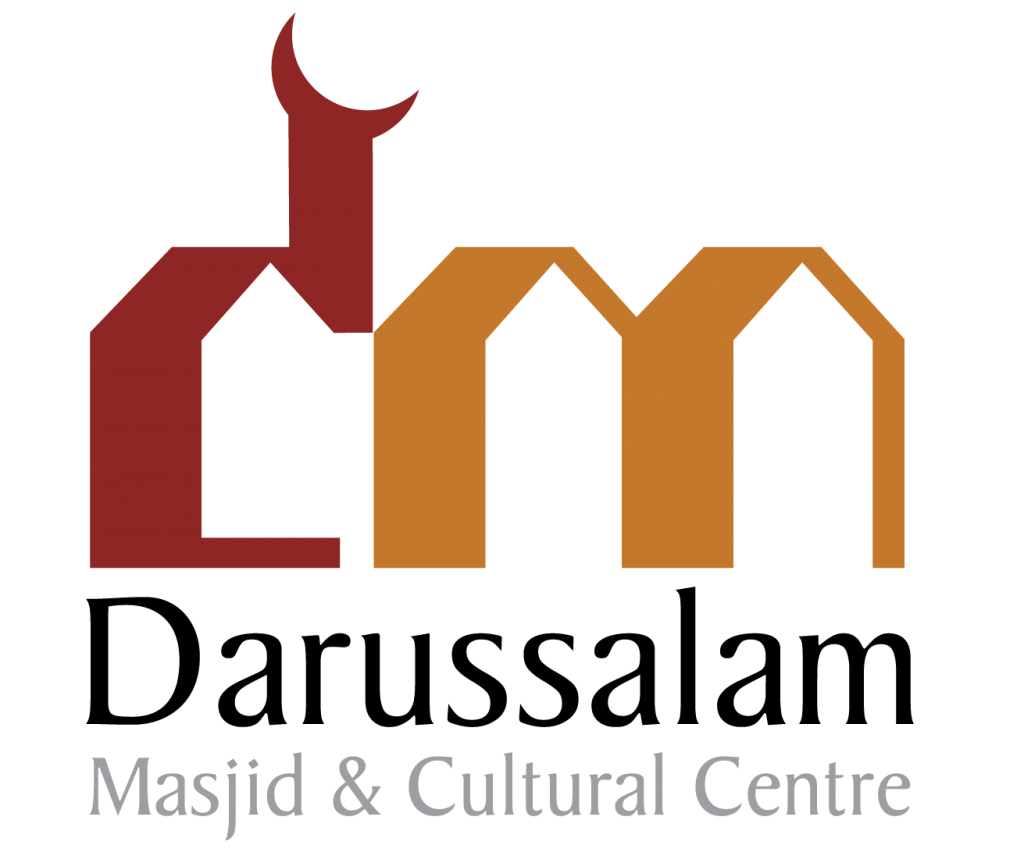
Funeral Services
We have carried out funeral services for our Muslim community since 2014. We provide a caring and compassionate service that treats the deceased with the utmost respect. Muslim law and tradition have endowed a Muslim’s funeral with profound religious significance, we aim to uphold this significance with dignity, sanctity and modesty.
We have a fully equipped Mortuary and private transport ambulances that are usually able to carry out burials on the same day in almost any cemetery when burial certificates are prepared.
Professional Funeral staff
We have all the equipment, dedicated staff and qualified volunteers required to provide a full service for men and women in a manner that complies with the Shari’ah.
Our funeral service cover

- Pick up the deceased from home, hospital or hospice
- The final bathing (Ghusal) of the deceased
- Shrouding of the deceased under the supervision of qualified personnel
- Booking the grave for the deceased
- Prayer of Salatul Janazah
- Transfer of the deceased after the preparation to the booked cemeteries
Funeral Services: THE Process
The five stages that follow the death of a Muslim are:
- The final bathing (Ghusal) of the deceased – tajheez.
- The shrouding (kafan) of the deceased – takfeen.
- The funeral prayers – Janazah Salah.
- The funeral procession – carrying the bier to the grave.
- The burial of the deceased – tadfeen.

It is important to complete the above stages as quickly as possible, for Rasulullah (saw) has emphasised:
“Make haste at a funeral; if the dead person was good, it is a good state to which you are sending him on; but if he was otherwise, it is an evil of which you are ridding yourselves.”
Even if the person dies on a Friday, the scholars have stated, “it is better to make all arrangements and bury the deceased before Jumu’ah salah” and that “delaying the funeral with the thought that there will be more participants after jumu’ah is undesirable”.
Moreover, the blessings and forgiveness for the deceased that will be acquired by adhering to the command of Rasulullah (saw) is more worthy then delaying the Janazah Salah, even with the possibility that more participants may attend.
Sharee’ah has also prohibited the delaying of the burial on account of a certain relative being overseas and this person’s inability to arrive quickly, for example, due to an unavailability of a flight.
Please note, to enable the burial take place as quickly as possible we need to comply with the formalities of the law of this country, which requires that the death is certified and registered. These formalities (summarised below) are extracted from the official document What to do after a death in England and Wales.
If the Death Occurs in a Hospital
If the death occurs in hospital, the hospital staff will contact the person named by the deceased as next of kin. The hospital will then keep the body in the hospital mortuary until the executor arranges for it to be taken away and the hospital staff will arrange for the nearest relative to collect the deceased’s possessions.
If the Death Occurs Elsewhere
If the death was expected, you should contact the doctor who attended the deceased during their final illness.
If the death was unexpected/sudden or you discover a body, you should contact the following people:
- The family doctors
- The deceased’s next of kin
- The local mosque
If there is any reason to suspect that the death was not due to natural causes, do not touch or remove anything in the room.
Cause of Death
If the cause of death is quite clear the doctor will give you:
- A Medical Certificate that shows the cause of death (this is free of charge and will be given in a sealed envelope addressed to the registrar).
- A Formal Notice that states that a doctor has signed the Medical Certificate and tells you how the death can be registered.
If the cause of the death was known to be a natural illness, but the doctors wish to know more about the cause of death, they may ask the relatives for permission to carry out a medical examination of the body (i.e., post-mortem) to find out more about the cause of death. Islam does not permit post-mortems in this instance and no such permission should be given.
If the death follows illness from HIV or AIDS, there may be special rules about handling the body.
Reporting a Death to the Coroner:
The coroner is a doctor or lawyer responsible for investigating deaths in particular situations and may be the only person able to certify the cause of death.
In any of the following circumstances, the doctor may report the death to the coroner and write on the Formal Notice that the death has been referred to the coroner:
- An accident or injury
- An industrial disease
- During a surgical operation
- Before recovery from an anaesthetic
- If the cause of death is unknown
- The death was sudden and unexplained, e.g., a sudden infant death (cot death).
If the doctor treating the deceased had not seen him or her, either after the death or within 14 days before the death, the death must be reported to the coroner.
The coroner may arrange for a post-mortem examination of the body. The consent of the relative is not needed, but they are entitled to be represented at the examination by a doctor. When relatives have told the coroner they wish to be represented, the coroner will if at all practicable, tell them when and where the examination will be.
The coroner will pay for the removal of a body from the place of death to the mortuary for post-mortem examination. The relatives may choose the funeral director.
If the post-mortem shows that death was due to natural causes, the coroner may issue a notification known as the Pink Form (Form 100), which gives the cause of death so that the death can be registered. The coroner usually sends the form direct to the registrar but may give it to you to deliver.
If the death was violent, unnatural, caused by an industrial disease, occurred in prison or if the cause of death remains uncertain after post-mortem examination, the coroner will hold an inquest. An inquest is an enquiry into the medical cause and circumstances of a death. It is held in public, sometimes with a jury, and it is up to the coroner how to organise the enquiry in a way that best serves the public interest and the interests of the relatives.
If an inquest is held, the coroner must inform the following people:
- The married partner of the deceased
- The nearest relative (if different)
- And the personal representative (if different from above).
Relatives can attend an inquest and ask questions of witnesses, but they may only ask questions about the medical cause and circumstances of the death. It may also be important to have a lawyer to represent you if the death was caused by a road accident or an accident at work.
The coroner may give you an Order for Burial (form 101) so that the funeral can take place and may be done before the inquest is completed, provided the body is not required for further examination.
The coroner will also send the registrar a Certificate After Inquest (form 99 [rev]) stating the cause of death – this allows the death to be registered.
If you want advice or information about a death which has been reported to the coroner, contact the coroner’s officer. You can get the address from the police station or, if the death was in hospital, the hospital official dealing with deaths.
Registering the Death:
To avoid delay, the death must be registered by the Registrars of Births and Deaths for the sub-district in which the death occurred. You can find their address by visiting the official website of the General Register Office, in the phone book under ‘Registration of Births, Deaths & Marriages’, from the doctor, local council, post office or police station.
Check when the registrar will be available and whether only you need to go along. It may be that someone other than you will be needed to give information for the death to be registered.
than you will be needed to give information for the death to be registered.
If the death has been referred to the coroner, it cannot be registered until the registrar has received authority from the coroner to do so (see above), otherwise, go to the registrar as soon as possible.
When you go to the registrar you should take all these:
- The medical certificate of the cause of the death
- The deceased’s medical card, if possible
- The pink form (form 100), if one has been given to you by the coroner
- The deceased’s birth and marriage certificates, if available
You should tell the registrar:
- The date and place of death
- The deceased’s last (usual) address
- The deceased’s first names and surname (and the maiden name where appropriate)
- The deceased’s date and place of birth (town and country if born in the UK, and country if born abroad)
- The deceased’s occupation and the name and occupation of their spouse
- Whether the deceased was getting a pension or allowance from public funds
- If the deceased was married, the date of birth of the surviving widow or widower.
The Registrar will give you:
- A Certificate for Burial – known as the Green Form– (unless the coroner has already given you an Order for Burial). These forms will give permission for the body to be buried and should be taken to the cemetery to enable the funeral to take place.
- Leaflets about widows’ benefits and income tax for widows.
- A Certificate of Registration of Death (form BD8 [rev]). This is for Social Security purposes only. Read the information on the back of the certificate. If any of it applies, fill in the certificate and show it to your Social Security office.
The Death Certificate
The death certificate is a certified copy of the one in the death register and the registrar can let you have one if you wish, but you will have to pay a fee.
You may need a Death Certificate for the will and for any pension claims, savings bank certificates etc. You may wish to ask for several copies of the Death Certificate straight away as the price increases if you need one later.
